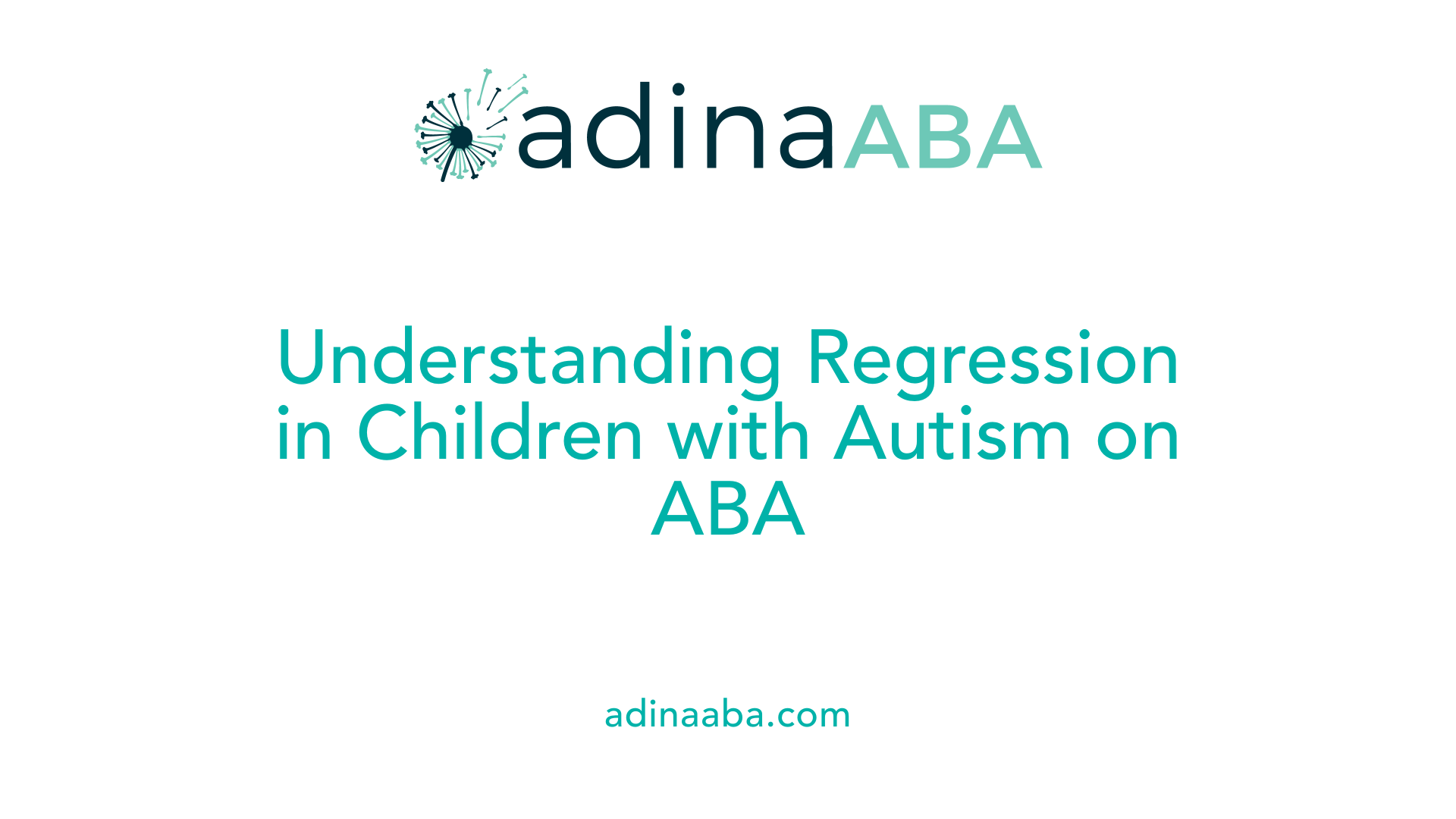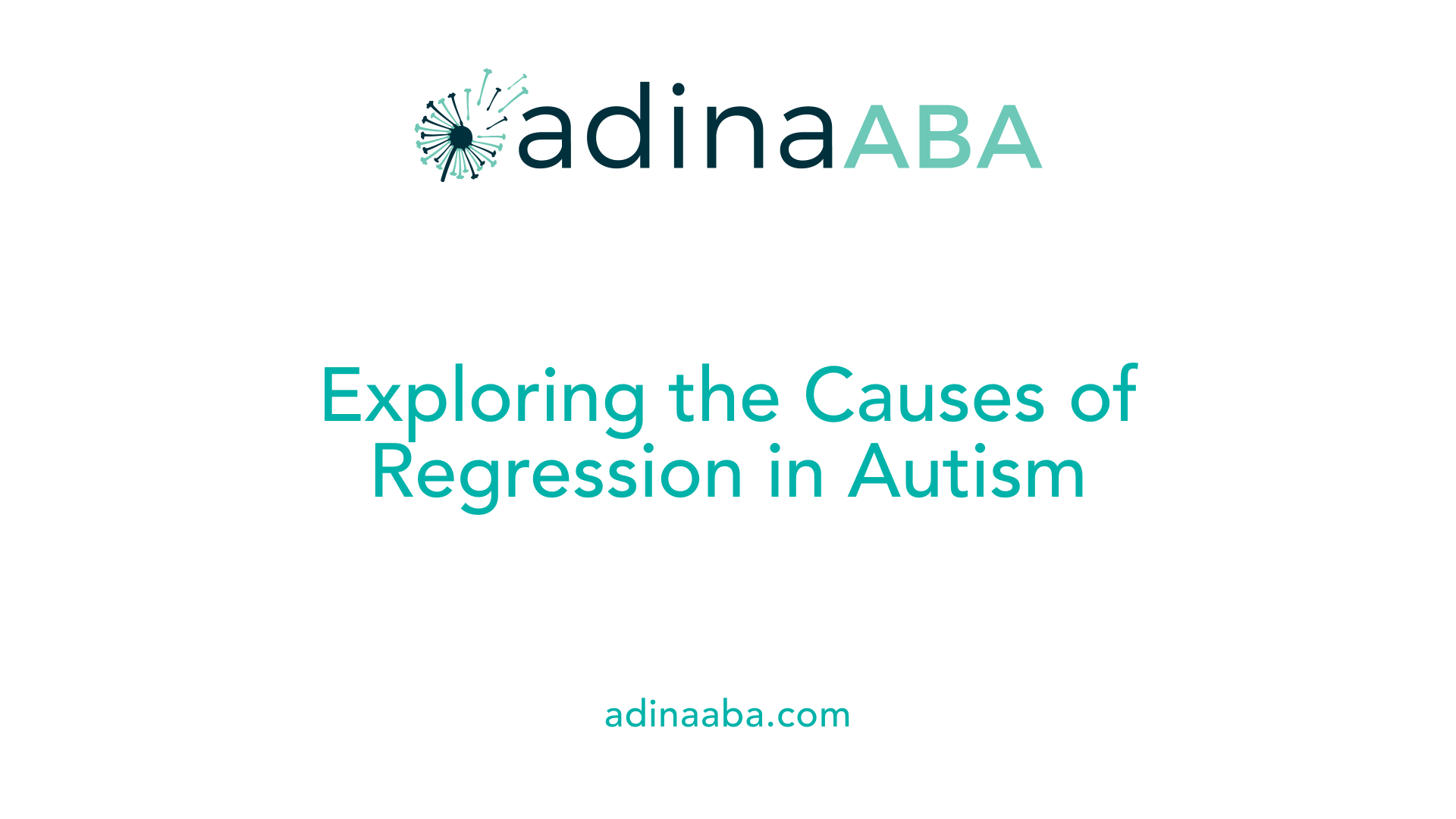How to handle regression in children receiving ABA

Understanding Regression in Children with Autism
Regression in children with autism, particularly those receiving ABA therapy, is a complex phenomenon characterized by a sudden or gradual loss of skills such as language, social interaction, and motor abilities. Typically occurring between 15 and 30 months of age, this regression can be distressing for families and challenging for clinicians. Recognizing the signs early and implementing appropriate management strategies are vital in supporting children's developmental trajectories.
What Is Regression in Children with Autism Receiving ABA Therapy?

What is regression in children with autism receiving ABA therapy?
Regression in children with autism who are undergoing ABA therapy refers to a decline or loss of skills that the child had previously gained. This often includes abilities such as speech, social interactions, motor skills, and adaptive behaviors. Typically, regression occurs between 15 and 30 months of age, although it can happen at any age.
Many children with autism who experience regression may have had mild developmental delays beforehand. The skill loss can be triggered by various factors, including changes in routine, illness, stress, or environmental shifts. During regression, children might stop speaking, refrain from social engagement, avoid eye contact, or lose other communication skills such as gesturing or pointing.
Addressing regression involves tailored interventions based on evidence-based practices like Applied Behavior Analysis (ABA). ABA therapy works by collecting data, applying positive reinforcement, prompting, and using natural environment teaching methods to help the child recover lost skills. Continuous assessment and close involvement of families are vital to adapt treatment plans effectively. When started early, ABA therapy can significantly help children regain their skills and support their overall development, ensuring they continue making progress despite setbacks.
Causes of Regression in Children with Autism
 Regression in children with autism typically involves a sudden or gradual loss of skills that were previously acquired, such as language, social interaction, or motor skills. Understanding what contributes to this regression is important for early intervention and effective management.
Regression in children with autism typically involves a sudden or gradual loss of skills that were previously acquired, such as language, social interaction, or motor skills. Understanding what contributes to this regression is important for early intervention and effective management.
Genetic and neurological factors play a significant role. Many children with autism have genetic predispositions that influence brain development. Neurological differences, including atypical brain connectivity or processing, can make some children more vulnerable to losing skills they once had, especially during critical periods of development.
Environmental influences are also crucial. Exposure to toxins during pregnancy or early childhood—such as certain chemicals or pollutants—may impact neural development. Additionally, prenatal factors like maternal health issues or complications during pregnancy could increase the risk of regression.
External stressors and disruptions can trigger regression or make it more pronounced. Major life changes, such as moving to a new home, the birth of a sibling, or changes in routine, can destabilize a child’s environment. Illness, infection, or mental health challenges like anxiety and overwhelming stimuli may also result in temporary or lasting skill loss.
A common misconception is that vaccines cause regression in autism; however, extensive scientific research has found no causal link between vaccinations and skill loss. Instead, regression appears to be more closely related to underlying biological factors and environmental conditions.
Summary table:
| Cause Category | Examples | Notes |
|---|---|---|
| Genetic and neurological | Brain structure differences, genetics | Underlying predispositions affecting development |
| Environmental influences | Toxins, prenatal exposures | May impact neural development during critical periods |
| External stressors | Routine changes, illness, trauma | Can exacerbate existing vulnerabilities or trigger regression |
| Misconceptions | Vaccines | No scientific evidence links vaccines to regression |
Recognizing the multifaceted origins of regression helps caregivers and professionals tailor approaches that support skill retention and recovery, emphasizing early detection and comprehensive intervention.
Impacts of External Disruptions like COVID-19 on Regression
 During the COVID-19 pandemic, many children with autism faced increased risks of regression due to multiple external factors. One major issue was the loss of routine and stability, which are crucial for children with autism. Regular schedules, school routines, and consistent therapy sessions provide a structured environment that helps in maintaining skills. When these routines were suddenly disrupted, children often struggled to adapt, leading to setbacks.
During the COVID-19 pandemic, many children with autism faced increased risks of regression due to multiple external factors. One major issue was the loss of routine and stability, which are crucial for children with autism. Regular schedules, school routines, and consistent therapy sessions provide a structured environment that helps in maintaining skills. When these routines were suddenly disrupted, children often struggled to adapt, leading to setbacks.
Another significant challenge was the interruption of therapy services. In-person therapies like ABA, speech, and occupational therapy are vital for skill development. During the pandemic, many of these services were paused or moved to virtual platforms. While telehealth provided a necessary alternative, it often couldn't fully replicate the effectiveness of face-to-face interaction, leading to possible regression in communication, social skills, and adaptive behaviors.
Additionally, the upheaval caused by the pandemic increased stress and anxiety levels among children. The changes in their environment, uncertainty, and lack of familiar support structures led to heightened emotional responses. Stress can trigger challenging behaviors such as meltdowns, sensory overload, or increased self-stimulatory actions, which may hinder progress.
Limitations of telehealth also played a role. Although virtual therapy sessions maintained some level of intervention, they posed challenges like technical difficulties, reduced engagement, and difficulties for children who rely on hands-on guidance. This inconsistency in therapy access and quality can exacerbate skill loss.
In summary, external disruptions like COVID-19 affected children with autism by destabilizing routines, halting or reducing effective therapies, raising anxiety, and limiting therapy quality. These factors collectively contributed to regression in skills related to communication, social interaction, and daily functioning, posing new challenges for families and professionals working to support these children.
Management and Intervention Strategies for Regression

How can regression in children receiving ABA be managed and addressed?
Managing regression in children undergoing ABA therapy requires a proactive and comprehensive approach. Early detection of signs is crucial, which can be achieved through regular behavioral and developmental assessments by trained professionals. Recognizing when a child begins to lose previously acquired skills like language, social interaction, or motor abilities allows for timely intervention.
It is also important to investigate and address any underlying medical or environmental factors that may contribute to regression. Conditions such as gastrointestinal issues, immune dysfunctions, or stress can impact development. Providing targeted medical treatments alongside behavioral support helps create a stable foundation for the child's growth.
Behavioral strategies within ABA focus on reinforcing positive behaviors and helping children reacquire lost skills. These interventions are individualized, with routines designed to promote communication, social engagement, and adaptive behaviors. Techniques such as positive reinforcement—praising and rewarding progress—are vital.
Adjustments based on ongoing data collection play a key role. Flexibility in intervention plans ensures that strategies remain effective and responsive to the child's needs. Incorporating stress management, resilience-building activities, and emotional regulation techniques can further support recovery.
Utilization of a multidisciplinary team—including speech therapists, occupational therapists, medical professionals, and behavior analysts—ensures comprehensive care. Collaboration among these experts allows for holistic support addressing all aspects of the child's well-being.
Parents and caregivers are integral to this process. Maintaining consistent routines, reinforcing learned skills at home, and communicating regularly with therapists help strengthen intervention efforts. Monitoring progress and being adaptable in strategies foster confidence and resilience in children.
In summary, managing regression in children receiving ABA involves prompt assessment, medical and environmental management, personalized behavioral techniques, team collaboration, and active parental involvement. These combined efforts maximize the likelihood of skills recovery and ongoing development.
Preventative Strategies to Minimize Regression Risks

What strategies can be employed to prevent or reduce regression during ABA therapy?
Preventing regression in children with autism, especially during ABA therapy, involves a combination of proactive and supportive strategies aimed at maintaining and generalizing skills.
One of the most effective methods is establishing consistent routines. Using visual aids such as visual schedules, timers, and transition alerts helps create predictable environments, reducing anxiety and making it easier for children to adapt to changes. These visual cues serve as gentle prompts and help children understand what to expect next, leading to greater cooperation.
Reinforcing skills regularly across various settings is vital. Practicing learned behaviors through structured activities, natural reinforcement, and community interactions ensures that children do not just learn skills in a clinical setting but also apply them in daily life. This consistent practice helps strengthen skills and prevents regression.
Caregiver involvement plays a crucial role. Training and educating parents and family members enable them to support skill reinforcement at home. When families participate actively in therapy, children experience more stability and are less likely to lose previously acquired skills.
Early detection of regression signs is essential to address issues promptly. Monitoring developmental milestones and maintaining open communication with educators and therapists allows for swift intervention, which can minimize skill loss and facilitate quick recovery.
Finally, a multidisciplinary approach that includes behavioral therapies like ABA, speech, and occupational therapies, along with ongoing assessments, promotes comprehensive support. These combined efforts help sustain progress, address underlying sensory or communication challenges, and reduce the chances of regression.
In summary, consistent routines, skill reinforcement, caregiver engagement, early detection of regression signs, and collaborative, multi-disciplinary care form the foundation of effective strategies to prevent or minimize regression in children receiving ABA therapy.
Supporting Children During Regression: Practical Approaches for Parents and Therapists
What are some practical strategies for parents to handle regression?
Parents play a vital role in helping children manage regression effectively. Practical approaches include breaking complex tasks into smaller, manageable steps, which makes learning less overwhelming for the child.
Using visual aids and prompts is also beneficial. Visual supports, such as picture schedules or cue cards, help children understand expectations and can stimulate communication.
Immediate positive reinforcement, like praise or small rewards, encourages children to practice and regain lost skills. Remaining patient and flexible during setbacks fosters a supportive environment that boosts confidence.
Consistent routines are crucial. Maintaining familiar daily schedules reduces anxiety and provides stability, helping children feel secure enough to reattempt skills.
Close collaboration with therapists ensures interventions are tailored to the child's current needs. Keeping open communication allows for adjustments to strategies and quick responses to new challenges.
Parental involvement and confidence significantly influence recovery. Active participation, combined with professional guidance, helps children rebuild skills and sustain progress during and after regression episodes.
Conclusion: Supporting Developmental Progress Amid Regression Challenges
What is the overall outlook for managing regression in children with autism receiving ABA?
Regression in children with autism who are undergoing ABA therapy is generally considered temporary. With the right support and strategies, children often regain their lost skills and continue their developmental journey.
Early intervention is crucial. Evidence-based therapies like ABA play a significant role in addressing regression effectively by focusing on positive reinforcement and skill-building. When combined with support from speech, occupational, and behavioral therapies, children can work through setbacks more successfully.
Recognizing that regression is a common part of development helps caregivers and clinicians respond with patience and flexibility. Adjusting intervention plans, reinforcing new skills, and maintaining consistent routines support recovery.
Regular progress monitoring allows for timely modifications, ensuring that each child's evolving needs are met. Family involvement and a resilient mindset are vital in maintaining momentum and fostering confidence.
While challenges like regression can be disheartening, many children show remarkable recovery when provided with dedicated, tailored support. In the end, a comprehensive, multidisciplinary approach creates the best environment for children to recover skills, develop resilience, and thrive.
Turning Challenges into Opportunities for Growth
While regression can be a distressing aspect of autism development, early detection, comprehensive intervention, and active family and multidisciplinary participation significantly enhance the child's ability to recover and progress. Understanding the causes, manifestations, and management strategies of regression equips parents and professionals to respond effectively, transforming setbacks into opportunities for strengthened skills and resilience. With ongoing support and tailored interventions, children can overcome regression challenges and continue their developmental journey with confidence.
References
- Regressive Autism: Why It Happens and How We Can Support
- Regressive Autism: Why It Occurs
- How To Handle Regression In ABA Therapy: Expert Tips For Parents
- Children With Autism Post-COVID-19: Assessing Potential ...
- Why Does Autism Regression Happen & How Can I Support My ...
- How to Prevent Summer Regression for Children with Autism
- Best Practices for Maintenance in ABA Therapy: Proven Strategies ...
- Exploring Regressive Autism in Children - Move Up ABA
- Regressive Autism: Why It Occurs
- Applied Behavior Analysis in Children and Youth with Autism ...
More Resources
Expert Clinicians
Get started today ->


.jpg)
.jpg)
.jpg)

.jpg)